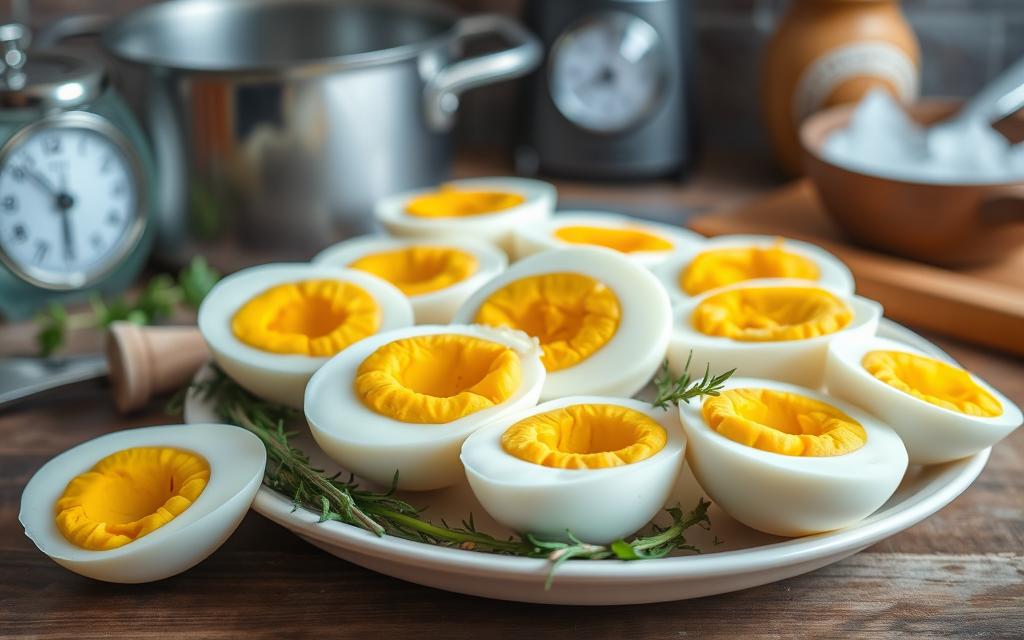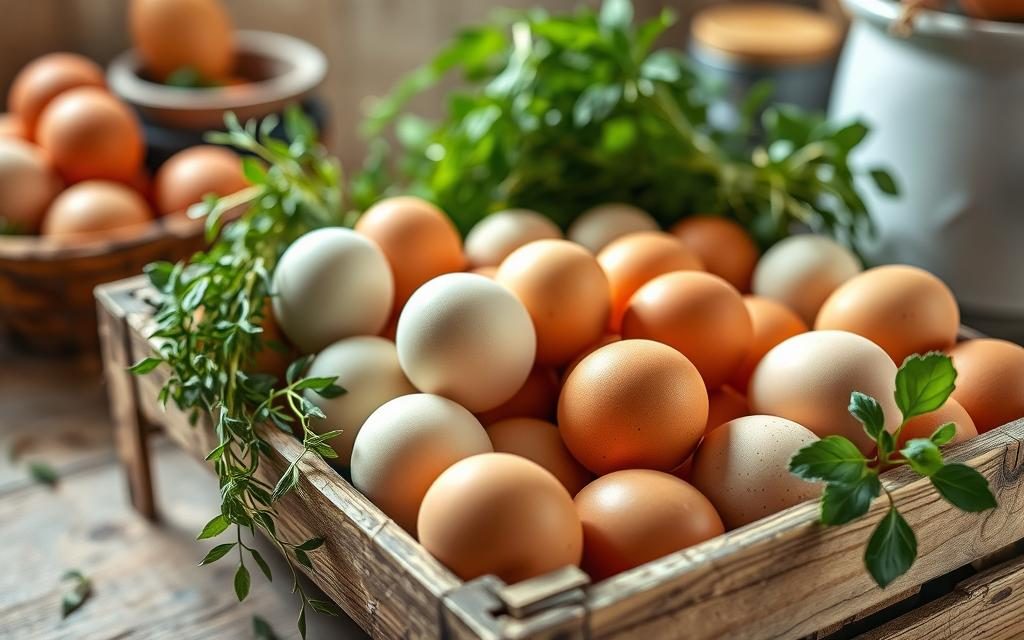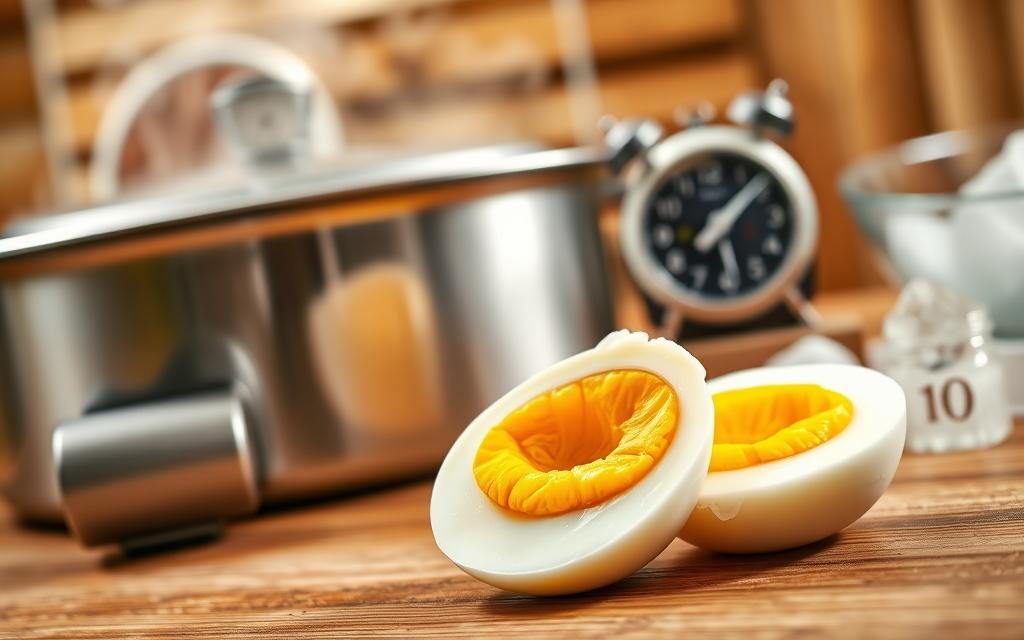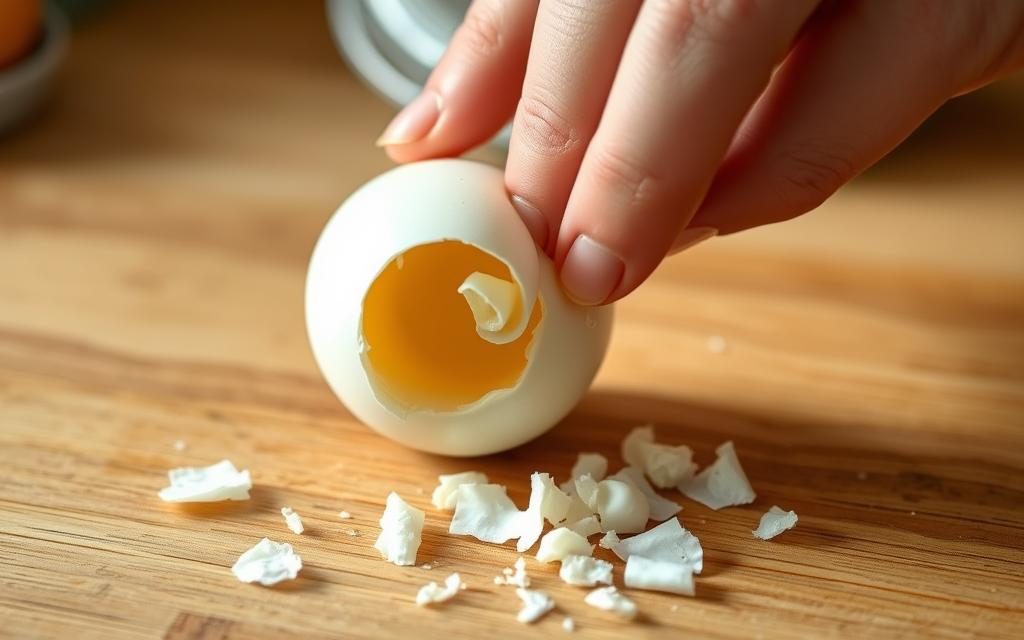
Are you tired of getting rubbery, overcooked eggs? Or shells that stick to your eggs? Making perfect hard boiled eggs is actually easy.
Learning to make hard boiled eggs can change your breakfast, salads, and snacks. The key is knowing the right technique, timing, and egg choice.
This guide has a 4.83 out of 5 rating from 513 votes. It shows you how to make perfect hard boiled eggs every time. These tips work for both new cooks and experienced chefs.
Key Takeaways
- Cooking time typically ranges from 10-12 minutes
- Use eggs that are 1-2 weeks old for easier peeling
- Ice bath is key to stop the cooking process
- Up to 12 large eggs can be boiled at once
- Proper storage lets eggs last up to 5 days in the fridge
Why Hard Boiled Eggs Are Popular
Hard boiled eggs are loved for many reasons. They are great for many dishes and are very good for you. Learning the best way to make them can make them even better.
Nutritional Powerhouse
These small eggs are full of nutrients. One egg has:
- 6 grams of high-quality protein
- Essential vitamins like D, B12, and choline
- Minerals such as selenium and zinc
- Only 70 calories per egg
Culinary Versatility
Hard boiled eggs can be used in many ways. They are great for both chefs and home cooks. They can be used in many different dishes.
| Dish Category | Popular Preparations |
|---|---|
| Salads | Cobb salad, Nicoise salad, Egg salad |
| Appetizers | Deviled eggs, Pickled eggs, Scotch eggs |
| Snacks | Seasoned with salt, Sliced on toast, Protein-packed quick bite |
From Julia Child’s iconic cooking method to today’s trends, hard boiled eggs are a favorite. They offer nutrition, convenience, and great taste.
Essential Tools for Making Hard Boiled Eggs
Mastering foolproof egg boiling needs the right tools. Preparing perfect hard boiled eggs is not just about technique. It’s also about having the correct tools to support your egg cooking methods. Let’s explore the essential tools that will transform your egg preparation.
To achieve consistent and delicious results, you’ll need several key items:
- Medium-sized pot with a tight-fitting lid
- Precise kitchen timer
- Slotted spoon or skimmer
- Large bowl for ice bath
Egg Cooker: A Modern Kitchen Solution
For those seeking convenience, dedicated egg cookers simplify the hard boiled egg process. These specialized appliances remove guesswork from cooking, ensuring precise temperatures and consistent results every time.
Pot and Lid Selection
When selecting your pot, consider materials like stainless steel or aluminum. A heavy-bottomed pot helps distribute heat evenly, critical for foolproof egg boiling. The lid should fit snugly to retain steam and maintain consistent cooking temperatures.
Timer: Precision is Key
A reliable timer is key in egg cooking methods. Most experts recommend 11 minutes for perfectly cooked large eggs. Digital or analog timers can help you track cooking time accurately.
Remember, having the right tools makes egg preparation consistently delicious!
Choosing the Right Eggs
Choosing the right eggs is key for perfect hard boiled eggs. The age and type of eggs matter a lot. They help you get the best results in your hard boiled eggs tutorial.

Fresh vs Older Eggs
Egg age is important for hard boiling. Fresh eggs are hard to peel. But eggs 1-2 weeks old are easier.
- Fresh eggs have a tight membrane that sticks to the shell
- Eggs 7-10 days old peel better
- Refrigerated eggs are best for hard boiling
Organic vs Conventional Eggs
Choosing between organic and conventional eggs is up to you. Both can make great hard boiled eggs.
| Egg Type | Peeling Ease | Nutritional Value |
|---|---|---|
| Organic Eggs | Standard peeling difficulty | Higher omega-3 content |
| Conventional Eggs | Standard peeling difficulty | Good standard nutrition |
For better boiling, pick eggs without cracks. Let them come to room temperature before boiling. This helps a lot in your hard boiled eggs tutorial.
Step-by-Step Guide to Boiling Eggs
Learning to boil eggs can make you a better cook. It’s great for a quick breakfast or a snack. Knowing how long to boil eggs is key for perfect results.
Preparing the Eggs
First, get these things ready:
- Fresh eggs (room temperature)
- Large pot
- Slotted spoon
- Timer
- Bowl of ice water
Boiling Process
Here’s how to boil eggs perfectly:
- Put eggs in a single layer at the pot’s bottom
- Cover eggs with cold water, about 1 inch above them
- Bring water to a rolling boil over high heat
- Lower heat to keep a gentle boil
| Egg Type | Cooking Time | Yolk Texture |
|---|---|---|
| Soft-boiled | 3-6 minutes | Runny to creamy |
| Hard-boiled | 8-12 minutes | Firm and solid |
Cooling the Eggs
Put eggs in an ice bath right after cooking. This stops the cooking process and prevents green rings. It also makes peeling easier.
Tip: Large eggs need 12 minutes for hard-boiled. Extra-large eggs need one minute more.
Common Mistakes to Avoid
Getting hard boiled eggs right means knowing what to avoid. Tips for cooking eggs can help you steer clear of common mistakes. These mistakes can mess up your dish.

Preventing Overcooking
Overcooking eggs makes them taste bad. Look out for these signs:
- Green ring around the yolk means eggs are overcooked
- Rubbery egg whites mean they’ve been cooked too long
- Cooking times change with egg size and how you like them
Cooking times can be from 6 to 14 minutes. Pro tip: Use a timer and watch the time closely for perfect eggs.
Avoiding Egg Cracking
Eggs cracking while cooking is annoying. Here’s how to avoid it:
- Use eggs at room temperature to avoid shock
- Put eggs into water gently with a spoon
- Don’t put too many eggs in the pot
- Start with cold water and heat it up slowly
Older eggs are easier to peel because of changes in the egg white. Try using eggs that are a few days old for better results.
Remember, the more you try, the better you’ll get. Each time, you’ll get closer to making perfect, tasty eggs.
How to Peel Hard Boiled Eggs
Peeling hard boiled eggs can be hard for many. Learning the right ways can make it easy. Knowing some tips can help you peel eggs smoothly.

We found some cool facts about peeling eggs. We tested many ways and found some great tips for easy peeling.
Best Peeling Techniques
- Start peeling from the wider end of the egg where an air pocket exists
- Crack the entire shell surface gently before peeling
- Use cool water while removing the shell
- Roll the egg on a flat surface to loosen the membrane
Special Ingredient Tricks
Some ingredients can help eggs peel better. We tried many and found some interesting results.
| Ingredient | Peeling Impact | Effectiveness |
|---|---|---|
| White Vinegar | Dissolves calcium carbonate in shells | High |
| Baking Soda | Increases water pH | Moderate |
| Salt | Seals egg cracks | Low |
Pro Peeling Methods
For the best results, try these advanced tips:
- Create an ice bath immediately after boiling
- Let eggs cool for 15 minutes
- Gently tap and roll eggs to crack shells
- Peel under gentle running water
- Use a spoon to slide between membrane and egg white
Pro tip: Eggs that are 1-2 weeks old tend to peel more easily than extremely fresh eggs.
Flavoring Your Hard Boiled Eggs
Hard boiled eggs are great for adding flavor to your meals. With a few tips, you can make them taste amazing. Learn how to cook perfect hard boiled and start your culinary journey.
Seasoning Options to Elevate Your Egg Recipes
Try these seasoning ideas for hard boiled eggs:
- Sprinkle Everything Bagel Seasoning for a toasty, nutty crunch
- Use Old Bay for a complex blend of 18 spices
- Drizzle hot sauce for a tangy kick
- Experiment with international flavors like Chinese tea egg marinades
Unique Serving Ideas for Egg Enthuasiasts
Make your hard boiled eggs special with these ideas:
| Serving Style | Flavor Profile | Preparation Tip |
|---|---|---|
| Deviled Eggs | Creamy, Zesty | Mix yolks with mayonnaise and seasonings |
| Pickled Eggs | Tangy, Spiced | Soak peeled eggs in vinegar and spices |
| Grain Bowl Topping | Protein-Rich | Slice and add to mixed grain dishes |
Pro tip: Be creative! A little salt, pepper, or spice can make a simple egg taste like a gourmet dish.
Storing Hard Boiled Eggs Properly
Learning to boil eggs perfectly is not just about cooking. It’s also about how you store them. Storing hard boiled eggs right keeps them fresh and safe for your egg recipe.
Refrigeration Best Practices
Here are some important tips for storing hard boiled eggs:
- Store eggs in their shells to keep them fresh
- Put eggs in a covered container in the fridge
- Don’t store eggs in the fridge door because of temperature changes
Shelf Life and Safety
Knowing how long to store eggs is key for safety. Hard boiled eggs can last up to a week in the fridge if stored right.
| Egg Type | Storage Duration | Storage Recommendation |
|---|---|---|
| Unpeeled Hard Boiled Eggs | Up to 7 days | Refrigerate in sealed container |
| Peeled Hard Boiled Eggs | 1-2 days | Store in water, change daily |
Important safety tips include keeping eggs below 40°F. Also, watch for signs of spoilage like bad smells or slimy texture. Never leave hard boiled eggs at room temperature for more than two hours to prevent bacterial growth.
Storage Warning
Pro tip: Avoid freezing hard boiled eggs, as this will compromise their texture and quality when defrosted.
Creative Recipes Featuring Hard Boiled Eggs
Hard boiled eggs can make simple meals into fancy dishes. They are full of protein and easy to use. Learning how to cook them can make your food amazing.
Learn to make boiled eggs and find fun ways to use them. They go great in salads and sandwiches. Hard boiled eggs are very flexible.
Sensational Salad Creations
Salads are a great place for hard boiled eggs. Here are some tasty mixes:
- Classic Cobb Salad with crisp bacon and creamy avocado
- Niçoise Salad featuring tuna and green beans
- Keto-friendly shredded kale salad with pancetta
Sandwich Spectacular
Make your lunch better with these egg ideas:
- Classic egg salad with fresh herbs
- Club sandwich with sliced hard boiled eggs
- Scotch eggs wrapped in savory sausage
| Recipe | Prep Time | Servings | Calories |
|---|---|---|---|
| Kale Salad with Egg | 30 mins | 8 | 236 |
| Avocado Egg Salad Toast | 20 mins | 4 | 367 |
| Ramen Noodle Salad | 25 mins | 2 | 380 |
Pro tip: Try hummus or guacamole on top for a tasty snack!
Hard Boiled Egg Safety Tips
Keeping hard boiled eggs safe is very important. It helps stop foodborne illnesses. Knowing how to handle and store them is key.
Cooking Temperature Guidelines
Experts say certain temperatures are safe. The USDA gives these tips:
- Medium eggs: 12 minutes of cooking
- Large eggs: 15 minutes of cooking
- Extra-large eggs: 18 minutes of cooking
Checking for Spoilage
It’s important to spot bad eggs. Here’s how to keep eggs safe:
| Spoilage Indicator | Action |
|---|---|
| Off odors | Discard immediately |
| Discoloration | Do not consume |
| Floating in water | Egg is no longer fresh – throw away |
Remember these safety tips:
- Refrigerate eggs at 40°F or below
- Use hard boiled eggs within one week
- Never leave eggs at room temperature for more than 2 hours
- Use a bimetallic stemmed thermometer to check internal temperature
Always put food safety first when making and storing hard boiled eggs. This keeps you and your family safe.
Conclusion: Perfect Hard Boiled Eggs Every Time
Learning to make perfect eggs takes practice and care. Home cooks can now make eggs from soft to hard-boiled with ease. Knowing the right techniques is key to great results.
Success comes from controlling cooking time and method. Small eggs need 11-12 minutes, while big ones might take 14-15. Cooling eggs in ice water helps them peel better and keeps them tasty.
Trying different ways and paying attention to details can improve your egg skills. In 2019, 65 million searched for the “best way to boil an egg.” Remember, the more you practice, the better you’ll get at making perfect eggs.
With patience and the right methods, you’ll make egg cooking a breeze. You’ll impress everyone with your delicious eggs.




